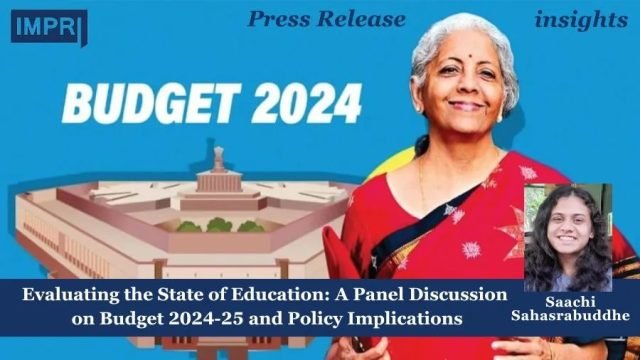Press Release
Saachi Sahasrabuddhe
IMPRI Centre for ICT for Development (CICTD), IMPRI Impact and Policy Research Institute, New Delhi successfully conducted a Panel Discussion on “The State of Education- #EducationDialogue” as a part of IMPRI’s 5th Annual Series of Thematic Deliberations and Analysis of Union Budget 2024-25 on 26th July 2024.
This discussion was chaired and moderated by Prof Sachidanand Sinha, Visiting Professor, Jawaharlal Nehru University (JNU), New Delhi.
The first panellist was Prof. Anita Rampal, Former Dean, Faculty of Education, New Delhi. She began by highlighting that budget allocations and schemes should be viewed through the lens of the election year. She critiqued the BJP’s neo-liberal approach in its manifesto and compared it with Congress’ focus on freedom of speech and the federal structure. Rampal noted the shift towards an input-output model in education, emphasizing ‘learning outcomes’ over “Learning Process” based indicators.
She discussed the focus on excellence versus equity, and the increased significance of vocational training from lower grades, and the impact of digital initiatives. Rampal also critiqued the new APAAR scheme and the Indian Knowledge System (IKS) in the manner in which it is implemented and questioned the nature and impact of the government schemes like PM SHRI, STARS, and VIDYANAJALI.
Prof. Binod Khadria ,Former Professor, Jawaharlal Nehru University (JNU)), New Delhi criticized the Budget as a missed opportunity, arguing it didn’t reflect the experience of the Finance Minister or the coalition government. He highlighted India’s low labour productivity, measured at $9 PPP*Purchasing Power Parity) per hour per employed person, and the cuts to UGC funding while directing funds to coalition states. He emphasized the need for a census and a comprehensive Demographic Analysis of the year 2047 for achieving the goal of ‘Vikasit Bharat”.
Citing the example of Assam he focused on the need to develop state-specific developmental strategies as well as state specific measures which can be incorporated in the New Education Policy (NEP). He argued that about 6% of the GDP is taken from the Education sector (through teachers, administrators and other persons working in the Education sector by some way or other) hence it justifies the demand for 6% of the GDP allocation to Education. He also compared the 24% rise in the allocation to the IT & Telecom sector as compared to the 0% rise in the allocation to Scientific Development.
Prof. Nalin Bharati, Professor, Department of Humanities and Social Sciences, IIT, Patne and Visiting Senior Fellow, IMPRI, criticized the allocation of a mere 0.7% of the GDP to Research & Development. He compared it with the Global average of 1.8% and even higher allocation in countries like US and China. He noted the disparity between the huge number of patents filed and the actual R&D expenditure. He also discussed the need for private funding partners for research.
He argued that the countries with strong Investments in Education and Health Sectors attract more FDIs. He also highlighted that only 1% of FDI goes to research, with past trends not favouring R&D investment. Dinesh Abrol countered, noting the significant incentives introduced by the government for private funding as well as the US playing a major role in this sector leading to sort of a ‘recolonization’.
Prof. Mona Khare ,Professor and Head, Department of Educational Finance, National Institute of Educational Planning and Administration (NIEPA), New Delhi, discussed the NEP principles of enrolment, equity, excellence, and employability. Despite the rising rates of enrollment in Higher Education, she noted the decline of per student availability of Public Funds as well as reduced share of education in social sector expenditure and total expenditure since 2017.
Athe 38% of colleges which receive UGC grants are majorly smaller Institutions or colleges in lesser developed regions. Hence they face the brunt of the cuts in UGC allocation. She found the internship opportunities through top companies and CSR activities a positive aspect but criticized the lack of policies guiding CSR investments in education. She highlighted concerns for the neglect of gender-inclusive funding, support for disadvantaged students, the ECC and Anganwadis. She also pointed out disparities in research funding for AI and robotics versus the social sector and questioned the effectiveness of the loan scheme and the HEFA (Higher Education Funding Agency).
Prof. Saumen Chattopadhyay, Professor and Chairperson, Zakir Hussain Centre of Educational Studies, Jawaharlal Nehru University (JNU), New Delhi highlighted the disparity between efforts to create world-class universities and the compromised research funding in public universities. He noted the 20% rise in digital e-learning allocation and heavy spending in certain sectors, which has impacted higher education budget. He criticized the lack of a level playing field among public universities, if fostering competition and achieving inclusivity in higher education is the aim behind providing autonomy to the colleges. He also addressed the challenges posed to some fiscally constrained states and the increased cost of education, arguing for a 6% GDP allocation to education, citing the ‘positive externalities’ contributed by education professionals.
The last panelist Dr, Y Suresh Reddy, Director, SRF Foundation, Gurgaon, spoke about the 4 approaches to view Education in terms of increase in allocation, allocation & spending, allocation and saving and the last being augmentation of resources.
Chair Prof. Sachidanand Sinha summarized the discussion by noting the differentiation among public institutions and the improvement seen in certain segments of society, particularly among non-OBC, non-SC, non-ST, and potentially non-Muslim groups. He acknowledged the Digital push in the Education Sector, while flagging concern to the increased size of the Virtual Classroom affecting the quality of education. He also rejected the State government claims of achieving universal secondary education and questioned the assessments of Caliber in grades 3, 5, and 7 as being the new Manusmriti.
The overall discussion focused around the insufficient increase in the Budget Allocation to Education from 2.7% to 2.9% (2024-25). The schemes and policies introduced by the government previously as well as in the Budget were discussed in depth. Though the discussion a common consensus of the need to increase the education budget significantly and an equitable distribution of fund in Research to Broad Sciences and Social Sciences was observed.
IMPRI’s 5th Annual Series of Thematic Deliberations and Analysis of Union Budget 2024-25
IMPRI’s 5th Annual Series of Thematic Deliberations and Analysis of Union Budget 2024-25
Watch the event at IMPRI #Web Policy Talk
Education, S&T, R&D and Union Budget 2024-25
Acknowledgement- The article is written by Saachi Sahasrabuddhe, an Intern at IMPRI. She is currently enrolled for M.A. Political Science at Mumbai University.



















